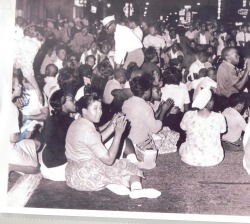Bennett's Sit-in Story
Bennett College's Civil Rights Timeline
"Come together for the good in the midst of the bad."
- Dr. Esther Terry, Bennett College Provost
- Dr. Esther Terry, Bennett College Provost
1955:
- Dr. Willa B. Player became the ninth president of Bennett College and the first Black woman college president in the United States since Dr. Mary McLeod Bethune assumed the presidency of Bethune-Cookman College in 1923
- Under the leadership of Dr. Willa B. Player, Bennett College gained membership in the Southern Association of Colleges and Schools
- September 22: Roslyn Smith, class of '61, submitted the obligatory Bennett College freshman essay on one's vision of self. In her own words, Smith describes her values, revealing the young mind that would soon absorb the words of Dr. Player, Dr. Martin Luther King Jr., Dr. Howard Thurman, and Dr. Benjamin Mays, spoken from the Bennett Chapel pulpit.
- February 8: Dr. Willa Player gave her keynote address before the National Council of United Negro College Fund Alumni.
- February 11: The Reverend Martin Luther King Jr. delivered a speech "A Realistic Look at Race Relations" at Bennett College's Annie Merner Pfeiffer Chapel. Bennett College was the only location that would allow Dr. King to address the local school integration fight in Greensboro.
- February 1: Four Black male freshman from North Carolina Agricultural and Technical College walked into Greensboro's downtown F.W. Woolworth store, bought a few items, and then sat down at the "whites-only" lunch counter to purchase something to drink.
- February 2: Women at Bennett College and dozens of male students at A & T joined the passive-resistance protest at the Woolworth's lunch counter.
- February 2: Bettye Davis, class of '63, made the commitment to join the four A & T freshmen at the "whites-only" lunch counter and to remain at the lunch counter until it was integrated.
- February 4: The Greensboro police arrested and detained nearly one dozen Bennett women overnight.
- April 21: Forty-Five A & T and Bennett students were arrested on charges that they were trespassing at the S.H. Kress & Co. lunch counter.
- April 22: The Daily News broke the story of the arrests with front-page headlines and a picture of a well-dressed female student awkwardly entering the back of a paddy wagon without assistance from the police officers surrounding it.
- July: Lunch Counters were integrated.
- July 26: 2:00 p.m., Four black store workers sat and ate lunch at the F.W. Woolworth lunch counter in Greensboro; No students were served until this day.
- July 2: The Civil Rights Act was passed due to violence happening at other store locations.
- July 2: Major restaurants and cafeterias in Greensboro desegregated because of a new law. Two cafeterias closed for good the Mayfair Cafeteria and the S & W Cafeteria.
- Clarence L. Harris learned that all the downtown department stores were moving out, and he retired in May.
- F.W. Woolworth was left as the only big merchant in downtown Greensboro.
- February 12: The Greensboro News & Record publishes an article to congratulate the anniversary of the "Greensboro Four" written by Eugenia Seaman Marks. She was a sit-in activist [1958-1961] at the former Woman's College, now known as University of Greensboro College.
- January: Store sales declined and the F.W. Woolworth building closed.
- February 1: Clarence L. Harris wrote the recording of the sit-in of February 1, 1960.
- February 1: International Civil Rights Center & Museum opened in the F.W. Woolworth building in downtown Greensboro on the 50th Anniversary of the lunch counter sit-in.

